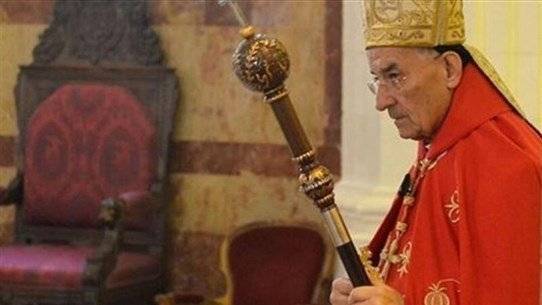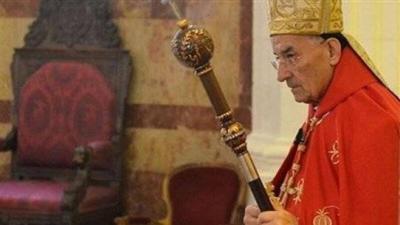The Maronite Patriarch Cardinal Mar Bechara Boutros Rai presided over Sunday Mass at Our Lady's Church in the Patriarchal Residence in Bkerke, assisted by Bishops Hanna Alwan and Peter Karam, with the participation of several other bishops and priests, alongside Minister of Justice Judge Henry Khoury and a crowd of dignitaries and faithful. After the Gospel, the Patriarch delivered a sermon titled "I was hungry and you fed me..." (Matthew 25: 35). He said, "The Church remembers today the saints and the righteous who lived love by being close to the hungry, thirsty, naked, strangers, sick, and imprisoned—not only in their material state, but also in their moral and spiritual state. Since Christ, the Son of God, became united with every human being through his incarnation, he identified with each one. Thus, he said: 'I was hungry and you fed me...' (Matthew 25: 35). It is clear from the Lord's words that 'at the evening of life, we will be judged on love.' We invoke the prayers of the saints and righteous so that God grants us the grace to resemble them in living love, witnessing to God's love with every human being."
He added, "We are pleased to celebrate this divine liturgy together, and I greet you all, and I congratulate the 'Qannoubin Association for Mission and Heritage' and the 'Gathering of Maronites for Lebanon' on the occasion of their publication of the book 'The Patriarch, the Servant, and the Teacher.' The book discusses his humanitarian initiatives during World War II and his pioneering national stances during his era. I also greet the prayer group for Saint Veronica Juliani, along with its guide Monsignor Charbel Anton and its founder Mrs. Julian Samaan, and its members, who number around 1,300 people from various regions and countries of the diaspora. They participate in a series of daily prayers and acts of mercy, with the group based primarily in Saint Joseph Church in Jounieh. We bless their initiatives and activities. I would like to extend special greetings to the family of our deceased relative Joseph Amin Gibril, the brother-in-law of my deceased brother Selim, whom we mourned deeply and prayed for on January 15 at the loved house of Shabab, along with his wife Mrs. Doris Anis Abou Zeid and his two sons, daughter, and all their relatives in Lebanon and abroad. I also greet the family of the late educator Elias Antoine Sarour, who has been our friend since we were Bishops of Jbeil. We mourned him with prayer on December 11 with his wife the educator Bahjat Halou and his daughters and siblings, as well as the residents of Maad.”
Continuing, he said, “Today’s Gospel illustrates the social dimension of the evangelization. Christianity based on the Gospel comprises three interconnected and integrated dimensions, called ministries: the ministry of the word with preaching and teaching, the ministry of sanctification through the distribution of divine sacraments, and the ministry of social love. Pope Francis elaborates on this concept of the social dimension or the ministry of social love aimed at enhancing the human person, liberating them from their constraints, and fostering their growth in his apostolic exhortation 'The Joy of the Gospel' (November 4, 2013). The foundation of this is the Holy Trinity, which we announce and to which we open ourselves for its work in us. When we proclaim our faith that the Father loves every human being, we discover that he grants them infinite dignity. When we state our belief that the Son of God took our human nature and redeemed us with his shedding of blood, we recognize that every human being is raised to the very heart of God, who honors them with his infinite love. And when we proclaim our faith in the Holy Spirit active within us, we realize that he seeks to enter every human situation and all interconnected and complex social structures to untie them.”
He pointed out, “The Lord Jesus identified six types of human needs: hunger, thirst, being a stranger, nakedness, illness, and imprisonment. These needs are not limited to the material level; they also encompass spiritual, moral, cultural, and ethical dimensions. The hungry are those in need of food and also of knowledge and spirituality. The thirsty need water and also justice and human compassion. The naked need clothing and also a household, good reputation, and dignity. The sick are those who suffer from physical or mental ailments, or those who are in an immoral state such as greed, malice, pride, or become addicted to drugs or intoxicants. The stranger is someone living outside their country and also the alien among their family who suffers from their lack of acceptance or understanding. The prisoner refers to someone behind bars and also someone who is a captive of their disordered inclinations or unconstructive stances or is stubbornly fixed in those stances or is enslaved by people or ideologies.”
He stated, “Social love becomes a law among those who genuinely love God. Saint Pope Paul VI defined political work as the highest act of love because it is based on selflessness and dedication in pursuit of the common good, which is the welfare of all citizens and the good of every individual citizen. We pray that God ignites this love in the heart of every political responsible individual. Our nation's economic, financial, livelihood, and currency needs are many. Our Lebanese state needs dedicated officials and reforms to restore it from a state of collapse. Therefore, we continuously demand that the parliamentary elections be held on their scheduled constitutional date on May 15 of next year. We call for extensive participation in these elections by Lebanese voters both in Lebanon and in the diaspora. The objective is to create a new reality in the country that brings about a change in the right constructive and national civilizational direction. We say this at a time when many attempts are made to delay the elections instead of intensifying preparations for them. This has raised concerns among Lebanon's friends, prompting them to issue strict statements warning Lebanese officials and others against tampering with electoral dates: from the declaration of Jeddah, the Kuwaiti initiative, the Arab Foreign Ministers Conference, the United Nations, the United Nations Security Council, the Vatican, to the European Union and the international group supporting Lebanon. All these have called for the necessity of holding elections on time, as all these countries and authorities recognize that elections, whether parliamentary or presidential, are an inevitable passage for Lebanon to regain its status as a respected state. We hope that the focus of electoral projects will revolve around issues such as addressing social and economic issues, Lebanon's neutrality, holding an international conference, broad decentralization, restricting arms to the army, and implementing international resolutions.”
He added, “These elements undoubtedly constitute the roadmap for saving Lebanon, revitalizing its state, restoring dignity to the people, protecting Lebanese unity, and preserving Lebanon's relations with itself and with Arab and international countries. Ignoring these essential matters for years is what has led us to the precarious situation we are in today, which necessitates taking bold and progressive stances. People's futures in their homelands among nations cannot be safeguarded through daily compromises and settlements. An encouraging sign is that public stances are beginning to emerge, indicating the interest of brotherly and friendly countries in finding a solution to the Lebanese crisis within the framework of both Lebanese and international legitimacy. May the Lebanese state respond more seriously to constructive proposals so that it does not sidestep them to waste time and squander opportunities.”
He continued, “In this context, the challenges facing the country require rallying around the main state institutions and refraining from discrediting them, especially the Lebanese Army. The army is the guarantor of sovereignty and security, and it oversees national peace. We must here extend our gratitude to all countries that provide this national military institution with assistance and equipment to enable it to continue fulfilling its role, especially in the upcoming phase which demands maintaining security during the electoral events across all Lebanese territories.”




